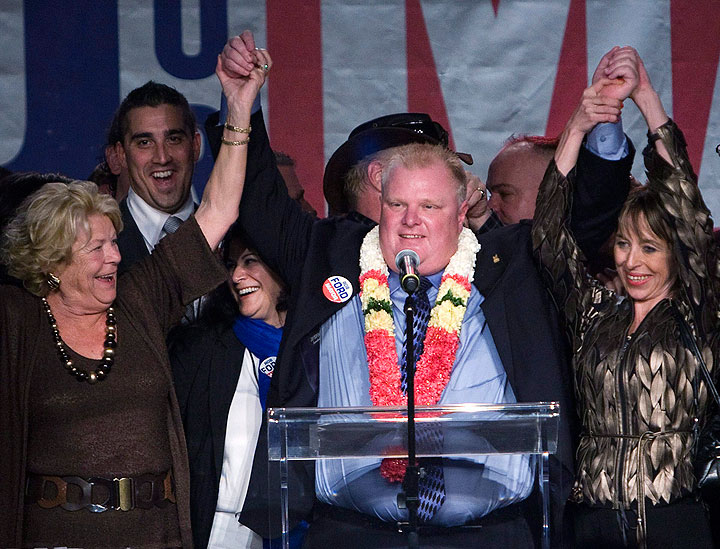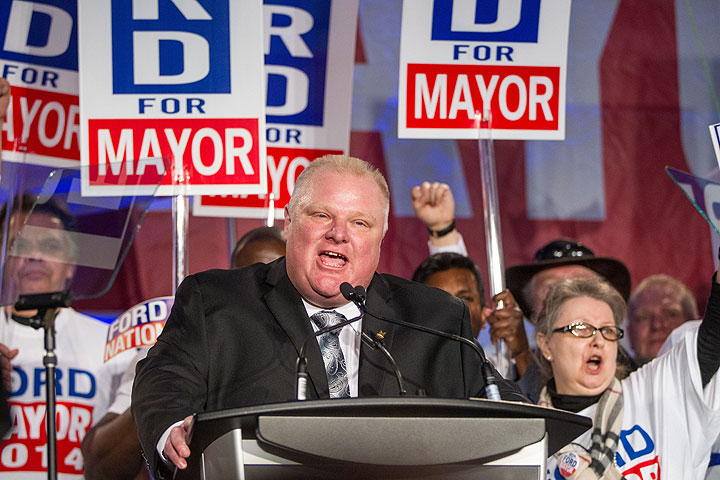WATCH ABOVE: Mark McAllister takes a look back at four years of Rob Ford and the legacy of his mayoralty.

TORONTO – Toronto voters chose John Tory as the successor to Mayor Rob Ford Monday, who dropped out of the race for re-election after being diagnosed with cancer.
Ford was re-elected in Ward 2 however and kicked off his 2018 mayoral election during his victory speech Monday.
Here are some key points of his political career:
(Scroll down for an interactive version of the timeline)
—
1997: Ford runs for city council in a west-Toronto ward. He comes in fourth.
—
2000: He tries again in an adjacent ward and is successful. He is re-elected in 2003 and 2006.
—
2010:
March 25 – Ford announces his candidacy for mayor and is widely dismissed as a long shot.
—
Oct. 25 – Ford is elected as mayor with just over 47 per cent of the vote, riding a wave of populist support built on his promise to fight the gravy train and cut government waste.
—
2013:
May 16 – The Toronto Star and U.S.-based news site Gawker report that Ford was seen on video smoking what appears to be crack cocaine and making racist and homophobic comments. They also say the video is being shopped around by a group of men allegedly involved in the drug trade. Ford later denies the allegations.
—
Oct. 31 – Chief Bill Blair announces Toronto police recovered a copy of a video file that depicts images of Ford “consistent with those previously reported in the press.” Blair said police had no “reasonable” grounds to criminally charge the mayor but added he was “disappointed” by the video.
—
Nov. 5 – Ford admits he smoked crack cocaine about a year earlier while in one of his “drunken stupors.” The mayor says he has nothing left to hide.
—
Nov. 13 – Newly released parts of a court document show former staffers of the mayor told police he was intoxicated at work, drank while driving and associated with suspected prostitutes. The release came shortly after Ford admitted buying illegal drugs while in office.
—
Nov. 18 – City council votes by a wide margin to slash Ford’s mayoral budget and hand many of his duties to the deputy mayor.
—
2014:
Jan. 2 – Ford files his nomination papers for re-election on the first day it’s allowed.
—
Apr. 30 – Ford’s lawyer announces the Toronto mayor will take a leave of absence to seek help for substance abuse. The announcement comes just hours after the Globe and Mail reported that a drug dealer had shown two of its reporters a video of Ford allegedly smoking what was said to be crack cocaine.
—
June 30 – Ford returns from rehab to resume his limited duties as mayor, saying that seeking treatment for substance abuse was a life-saving decision. He also makes it clear he will continue his campaign to be re-elected.
—
Sept. 10 – Ford is admitted to hospital after complaining for months of abdominal pain. Doctors discover a tumour and a biopsy is done the next day after he is transferred to a downtown Toronto hospital.
—
Sept. 12 – Ford withdraws from the mayoral race just ahead of an official deadline to do so. Instead he files papers to run again for council in his former suburban Toronto ward.
—
Oct. 27 – Ford is elected to represent Ward 2 and appears to kick off his mayoral re-election campaign during his victory speech.


Comments